June 9, 2025 | 03:09 GMT +7
June 9, 2025 | 03:09 GMT +7
Hotline: 0913.378.918
June 9, 2025 | 03:09 GMT +7
Hotline: 0913.378.918
With a scale of 5,600 sows and 54,000 market pigs, the Xuan Thien Thanh Hoa 1 high-tech livestock production project, owned by Xuan Thien Group, commits to refraining from discharging water into the environment.
Notably, the company applies an odor-filtering technology in combination with scientific nutrition regimes for the farmed pigs in order to reduce odor in their waste.
Subsequently, waste is thoroughly treated through a continuous manure scraping system in order to eliminate waste storage within the barns. Solid waste, after being separated, is transferred to an organic fertilizer processing plant. Wastewater is treated through a biogas system, sedimentation tanks, and microbial tanks. After meeting treatment standards, the treated wastewater is reused within the farm, thereby contributing to water conservation and environmental protection.
On the other hand, the livestock production area is located in a valley surrounded by high natural hills, with additional trees planted to serve as a buffer zone. Moreover, the production area utilizes disease isolation measures in order to prevent disease, and maintain a clean and safe production environment.
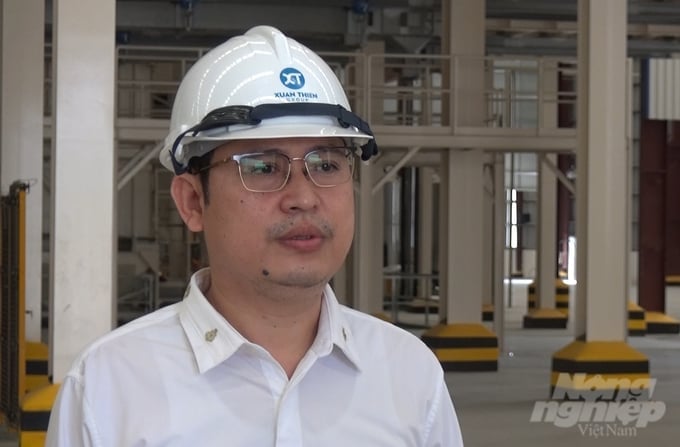
Nguyen Huy Hoang, General Director of Xuan Thien Group. Photo: Quoc Toan.
Xuan Thien Group has constructed and installed Vietnam's most advanced equipment and technology within its livestock production area
Namely, the cages, pens, and ceilings are made from stainless steel, equipped with automatic ventilation and cooling systems to ensure a comfortable and disease-free production environment. Additionally, the pigs are fed with liquid feed to optimize absorption.
Nguyen Huy Hoang, General Director of Xuan Thien Group, revealed, "The company identifies itself as a resident of Ngoc Lac district, Thanh Hoa province. As a result, protecting the environment is not just a mission and responsibility, but also a determining factor in the success of the company's business operations. We are committed to not discharge a single drop of water into the environment. Wastewater within the farm is treated and recycled for reuse. All of Xuan Thien Group's activities are aimed at protecting the environment, improving product quality, and driving the company towards comprehensive and sustainable production."
According to General Director Nguyen Huy Hoang, the decision to select Thanh Hoa as the company's destination stems from the province's potential and advantages, as well as its investment incentive policies and the local government's support in resolving administrative procedures. These factors have facilitated the rapid implementation and operation of the project.
In addition to Thanh Hoa, Xuan Thien Group is investing in multiple high-tech agricultural models across various provinces. These models utilize closed-loop and circular agriculture systems that emphasize a "farm to fork" strategy. Notably, output waste from one production process within these models becomes an input resource for another.
"Xuan Thien Group has established a comprehensive production infrastructure that includes livestock and crop production areas, feed production plants, and processing plants. The by-products from production and processing plants are utilized as fertilizers for the raw material areas," explained General Director Hoang.
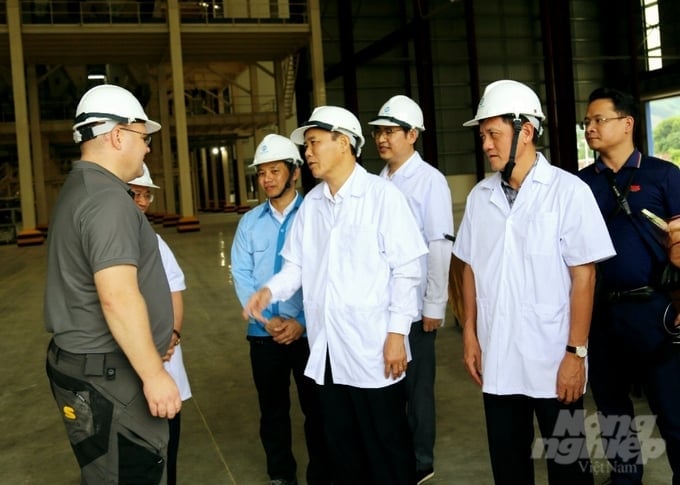
Deputy Minister of Agriculture and Rural Development Phung Duc Tien discussing animal feed production technology with a Danish expert. Photo: CTV.
Regarding Xuan Thien Group's high-tech livestock complex project, Deputy Minister of Agriculture and Rural Development Phung Duc Tien commented that circular production and emission reduction are inevitable development trends within the agricultural sector, particularly in livestock production.
Furthermore, the Deputy Minister encouraged businesses to invest in high-quality, circular agricultural models similar to that of Xuan Thien Group.
"Green, organic crop and livestock production with reduced emissions are the current development trends, especially given the intense competition among countries, regions, and agricultural products worldwide. Consequently, focusing on developing circular economy, circular agriculture, and circular livestock production will increase competitiveness, reduce product costs, and support sustainable agricultural development," Deputy Minister Phung Duc Tien emphasized.
According to Deputy Minister Tien, the agricultural sector currently produces approximately 156 million tons of by-products annually. With effective utilization, this by-product volume can serve as input material for developing circular economic models.
Regarding high-tech agricultural and notably, livestock production development, Deputy Minister Phung Duc Tien highlighted the limitations in current policies and mechanisms for attracting investment into high-tech agricultural zones.
Namely, investment attraction for high-tech agriculture lacks a methodical approach. As a result, the Ministry of Agriculture and Rural Development will coordinate with provinces and cities to review and assess the level of criteria compliance among high-tech agricultural models. This activity aims to select investors with strong potential, dedication, and vision for high-tech agriculture to build and sustainably develop the agricultural sector.
According to the Thanh Hoa province's Department of Agriculture and Rural Development, Xuan Thien Group's XH1 project quickly become operational following its inception. Accordingly, the company invested in constructing a large-scale high-tech livestock farm with modern equipment.
The farm currently houses over 50,000 pigs and a feed production plant. The project produces an average of 2,000 piglets per month. Additionally, it has sold 4,000 market pigs to date, contributing to local livestock development and providing clean food for the local community.
Additionally, the company has provided Thanh Hoa province with 6 billion VND for Covid-19 prevention efforts, new rural construction funding, and rural infrastructure investment in Ngoc Lac district.
Translated by Nguyen Hai Long
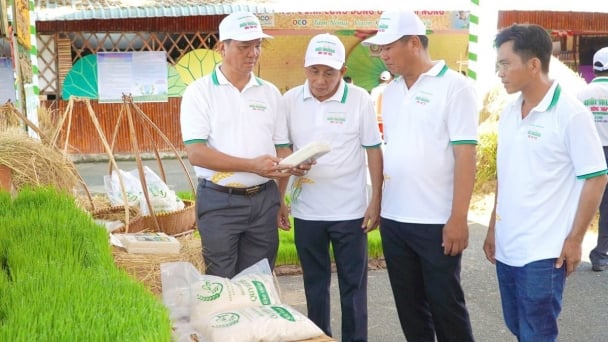
(VAN) Dong Thap has launched a meeting in response to the Action Month for the Environment under the theme 'Live Green - Join Hands for a Green Economy' at Tram Chim National Park.
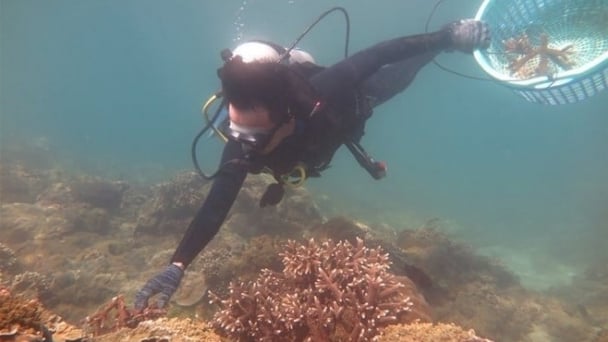
(VAN) The ocean has the capacity to absorb millions of tons of carbon, provided that mangrove forests, coral reefs, and biodiversity are protected.
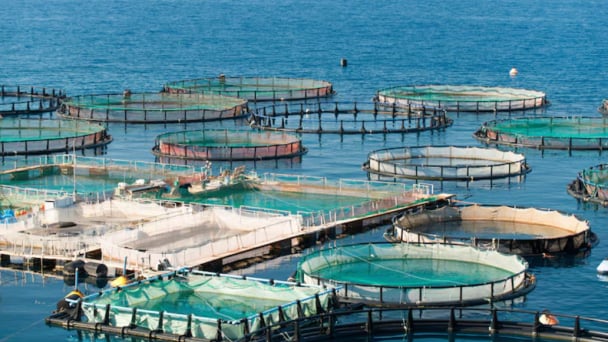
(VAN) Technology is redrawing the map of Vietnamese aquaculture: more modern, greener, and more sustainable.

(VAN) Novel process harnesses machine learning to reveal groups of genes that determine how efficiently plants use nitrogen.

(VAN) Several scientists and farmers are experimenting with soil treatment in some key durian-growing regions such as Cai Lay (Tien Giang), Dak Song, Gia Nghia, and Dak R’lap (Dak Nong).
/2025/05/25/4127-3-073637_820.jpg)
(VAN) Thanks to the promotion from an FAO-implemented project, vegetable production in greenhouses in Moc Chau has seen strong development, from 1.5 hectares in 2021 to nearly 50 hectares in 2024.

(VAN) FAO has recently supported USD 140,000 to implement the project 'Risk mitigation human-animal interface risks through disease control initiatives in pig farming.'